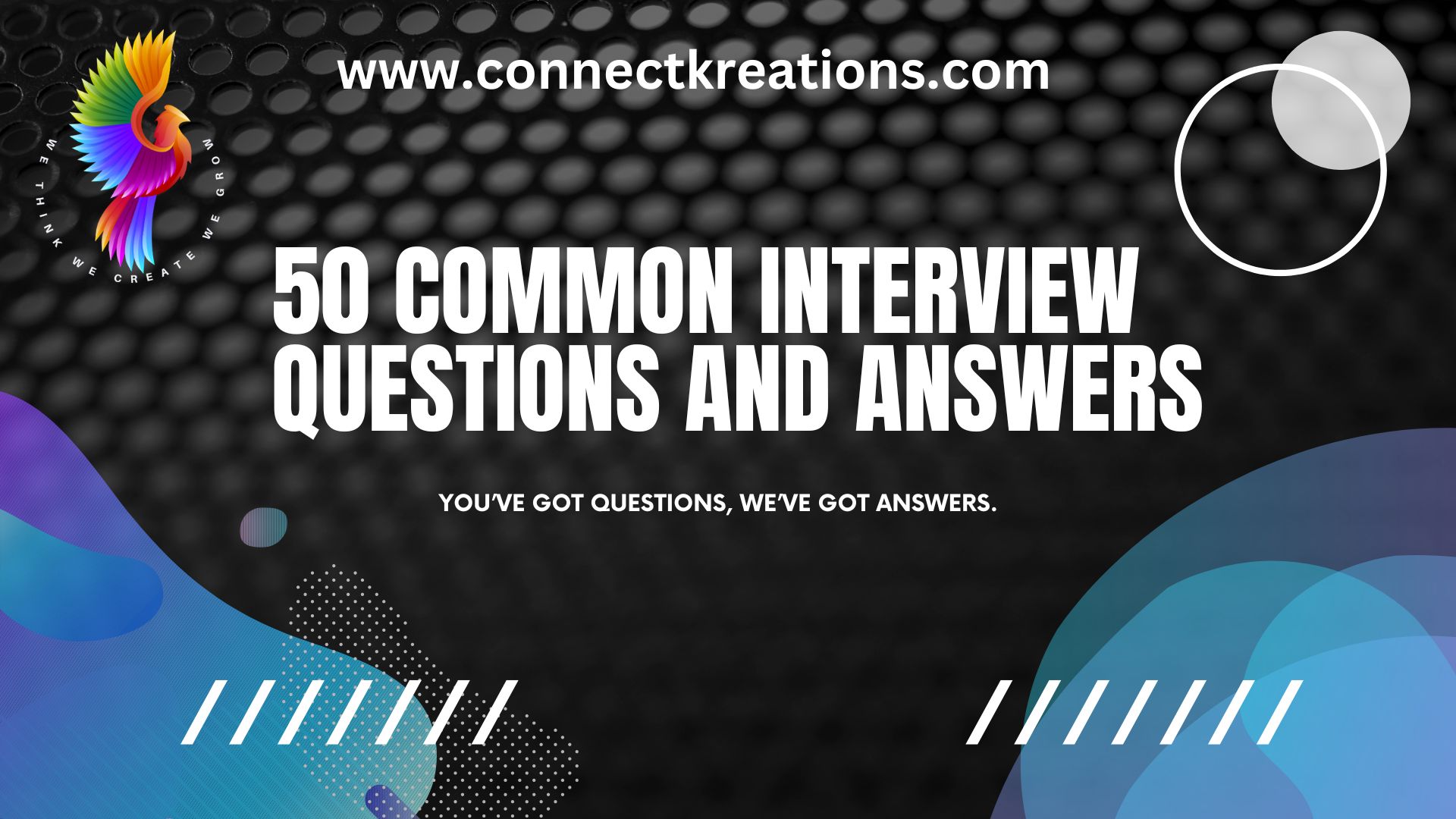

Top Common Interview Questions and Answers for 2023, Learn to Gain confidence
- Can you tell me a little about yourself?
- I am a hardworking and dedicated professional with experience in X, Y, and Z. I am excited to apply my skills and knowledge to a new opportunity and am eager to learn and grow with a company.
- Why are you interested in this position?
- I am interested in this position because it aligns with my career goals and allows me to utilize my skills and experience in X, Y, and Z. I am also excited about the opportunity to work with a dynamic and reputable company.
- What are your greatest strengths?
- My greatest strengths include strong communication skills, the ability to work well under pressure, and attention to detail.
- What are your greatest weaknesses?
- My greatest weakness is that I sometimes have trouble delegating tasks and tend to take on too much responsibility. However, I am actively working on improving this by learning to trust and empower my team members.
- Why should we hire you?
- You should hire me because I am a dedicated and skilled professional with experience in X, Y, and Z. I am also a quick learner, team player, and have a strong work ethic.
- Why did you leave your last job?
- I left my last job to pursue new opportunities and further my career development.
- What are your salary expectations?
- My salary expectations are flexible and negotiable, and I am open to discussing the details of compensation during the interview process.
- Why do you want to work for this company?
- I want to work for this company because it is a leader in the industry and has a strong reputation for producing quality products/services. I am excited about the opportunity to be a part of such a dynamic and reputable company.
- What are your long-term career goals?
- My long-term career goal is to progress in my field and take on leadership roles within a company, where I can make a significant impact and contribute to the growth and success of the organization.
- How do you handle stress and pressure?
- I handle stress and pressure by staying organized and prioritizing my tasks, taking breaks as needed, and communicating with my team and supervisor. I also make a conscious effort to maintain a healthy work-life balance.
- What are your hobbies and interests?
- My hobbies and interests include X, Y, and Z.
- How do you handle conflicts with coworkers?
- I handle conflicts with coworkers by staying calm and professional, and by communicating openly and honestly to find a solution that works for all parties involved.
- How do you handle difficult customers?
- I handle difficult customers by staying calm, listening to their concerns, and working to find a solution that addresses their needs while also meeting the company’s standards.
- How do you prioritize your tasks?
- I prioritize my tasks by assessing their level of importance and urgency, and by setting clear deadlines for completion. I also make sure to take into account any dependencies or potential roadblocks that may affect my progress.
- How do you stay aorganized?
- I stay organized by using tools like calendars, to-do lists, and task management software. I also make sure to clean and declutter my workspace regularly.
- How do you stay up-to-date with industry developments?
- I stay up-to-date with industry developments by regularly reading relevant publications, attending industry events, and networking with other professionals in my field.
Gain Confidence with this tips
1. Tell me about yourself.
Give a clear, concise and compelling outline of who you are and what you’ve achieved. Let your interviewer see something of your personality and interests, and explain to them why you believe that you’re the person they’re looking for. However, avoid getting bogged down in too much personal detail at this stage. Instead, focus on the key skills and experience that you have that are relevant to this job.
A good tactic is to discuss your present, your past, and your future. Start by summarizing your current position. Then, fill in details of skills that you’ve gained from previous roles. Finally, explain how this new job represents your ideal next step.
If possible, include one or two specific, measurable achievements, such as improvements that you’ve delivered or performance targets that you’ve exceeded. Use this question as an opportunity to demonstrate how you are ideally suited to this role. And show your confidence and enthusiasm from the start.
2. Why do you want to work for this company?
Demonstrate your knowledge of the company: it’s history, where it’s going in the future, and what its priorities are right now. And make clear that your own career goals point the same way.
Explain how your key strengths will help the company to move forward – and how working there will allow you to excel. Be as specific as you can about why this company, above any other, is the best place for you to have an impact, and why you’re so excited to apply.
3. What interests you about this particular job?
Show that you know exactly what this job entails, why you’d enjoy it, and how well-equipped you are to take it on. As with the previous answer, link the role to your career ambitions and goals, outlining why it suits you so well at this stage in your career.
Make it clear that you’re aware of the challenges involved, and that you’re excited about facing them. And be sure to focus on what you have to offer, as well as how you’re hoping to benefit in return.
4. How did you hear about the position?
No matter how you did hear about it, emphasize what it was about the role that interested and excited you. This is also an opportunity to highlight your professional connections, and to explain any existing links with the company that fueled your desire to apply.
Overall, show that you’re well-informed about your industry, organized in your approach to career development, and eager to seize good opportunities when they arise.
5. What do you know about our organization?
Show that you have a clear picture of the past, present and future of the company. It’s important to know key facts, such as how long it’s been in business, where it operates, and how well it’s doing financially. Say something about the market it operates in, including any current challenges or trends.
But also talk about the company’s values, and how these inform its targets and goals. And mention something that you’d like to learn more about – if you were to secure the job.
6. How has your career so far prepared you for this position?
To prepare for this question, identify the most important skills and experience that you’ll need to be successful in this role. Then, choose an achievement or lesson that you’ve learned in your career so far that relates to each of these Success factors. Three or four examples will be enough to make your case persuasive – as long as you include specific details, and mention measurable results.
7. Why do you want to change roles?
Depending on your reasons, this can be a tough question to answer. It’s important to keep your response as confident and forward-looking as possible, so that you actually come across as more attractive to a new employer, not less.
Don’t use this question to admit to failings, or to complain about your existing role – even if you dislike your current boss or department. Instead, explain what you’ve learned, and why you decided it was time to move on. Phrase your answer positively. For example, you could say that you’re looking for a new challenge or want to learn a new skill.
If you were let go from your previous job, be honest about it! Even setbacks like this can be phrased positively – as opportunities to refocus your goals, to learn from your experiences, to be resilient, and to forge ahead.
8. What is your greatest professional achievement?
The best example that you can give here will be something that relates to the job you’re applying for. Think of an achievement that you’re genuinely proud of. That way, you’ll show your passion for the job, your high professional standards, and a clear understanding of what real achievement means in your field.
Prepare a few examples, so that you can choose one that showcases something that you haven’t had a chance to address already. And explain them using the STAR method. This should cover:
• The Situation that you were in.
• The Task that you had to accomplish.
• The Actions that you took.
• Your successful Results.
9. Tell me about your worst boss.
This is a tricky question. So answer it with a mix of honesty, diplomacy and positivity. Pick a real example (make sure it’s not about someone working in the company you want to join), but be discreet about the person’s identity.
Focus on one aspect of their behavior, and explain exactly why this made it difficult for you to do your job well. Talk about how you dealt with it, what you learned in the process, and how it’s influenced your own approach to leadership since.
10. Describe a conflict that you faced at work – and how you dealt with it.
Again, be honest in acknowledging that conflicts do occur, but demonstrate how you are able to handle them reasonably and professionally. Pick an example when you were able to recognize a problem and explain how you found an effective way to deal with it. Perhaps you were able to defuse some tension in a heated team meeting or encouraged people to see others’ perspectives.
Remember, conflict can be valuable in some circumstances – for example, during a brainstorming session. But show that you understand when conflict becomes toxic, that you know how to anticipate it, and that you can head it off before it causes damage.
11. How good are you in a crisis?
This question allows you to define what a crisis is in your role or industry, and to outline the skills that you’ve developed to handle one if it occurs. Use a couple of carefully chosen examples to demonstrate key strengths, such as clearheadedness, initiative, problem solving, and common sense.
This is also a chance to show that you have the confidence and the interpersonal skills needed to lead others through difficult times.
12. When have you demonstrated leadership skills?
Start by explaining what good leadership means to you, and back up your points with examples. Leadership plays a part in almost every role, to some extent, so you should be able to demonstrate leadership credentials whatever stage you’re at in your career.
The STAR method (see question 8, above) is a good way to structure a clear and memorable answer. Talk about a time when you had a specific leadership challenge to overcome, and how you used skills such as strategic thinking, empathy, decisiveness, and clear communication to do so.
13. Describe a time when you showed initiative.
Initiative covers a number of key professional skills, including confidence, being a self-starter, spotting problems and opportunities, and coming up with creative ideas. For this answer, tell a story about a time when you not only showed initiative, but also achieved something measurable as a result.
14. When have you been innovative at work?
Again, innovation is a concept that encompasses many important attributes – the confidence to think and act differently, the creativity to find new solutions, and the flexibility to cope as things change.
Think of a time when you spotted a need to be innovative. What did you do? What was the positive impact of your new approach for your team and your organization?
15. Why should we hire you?
There are three points that you need to cover here:
First, show that you can do the job well. Use some punchy pieces of evidence that reflect your experience, attributes and skills. Then, demonstrate your knowledge of the company and the new role, to show that you’ll be a good fit.
Finally, pull out the most impressive relevant achievement from your career so far, to set your self apart from rival candidates.
16. What are your greatest strengths?
Focus on a few of your most impressive strengths – especially the ones that relate closely to this job. It’s a good idea to pick strengths that you know the company needs – for a spe cific project, perhaps, or to solve a particular problem – even if they’re not the ones you use most often.
As always, choose a clear example of each one in practice, showing the impact that it’s had at work. And seize the opportunity to talk up any strengths that haven’t figured in your answers so far.
17. What makes you unique?
Think about why people choose to come to you for help or advice on certain things, rather than anyone else. This a great way of framing your unique abilities, without appearing boastful. Talk about your accomplishments, too – for example, when you were the first to do something, or when you achieved more than anyone else.
And, since everyone’s career trajectory is unique, show why your particular mix of skills and experiences makes you the candidate best suited to this role.
18. What are you hoping for from this role?
Use your answer to show that you have a detailed understanding of the role, and ambitious expectations for what you can achieve in it. Demonstrate your enthusiasm, and talk about the ways in which you’d benefit – for example, by being challenged more, by learning new skills, or by enriching your experience in the industry.
Focus most on what you want to contribute to the role, and how you’d go about achieving a positive impact. Show the interviewer that you’re realistic, but also optimistic – and ready to deal with whatever the role throws your way.
19. What would your first 30/60/90 days here look like?
This is another test of how well you understand the role, the organization, and the industry as a whole. As with the previous answer, balance ambition with realism. Show that you’re eager to make an impact early on by suggesting some of the things that you already know you’d like to try if you got the job.
But also talk about the need to assess, strategize and plan; the time it takes to learn about a business from the inside; and the importance of building trust within your team and taking others forward with you.
If possible, suggest at least one specific early project the business could try. If it’s plausible, it will show that you’re committed to making things happen, and that you are able to develop well-considered plans – even if it doesn’t quite match the company’s current ideas.
20. What could you help us to do differently or better?
This is where detailed research will really pay off. For example, if you know an area where the company may be underperforming, or where it wants to improve and grow, highlight how your skills and experience could help.
Frame your answer positively. Talk about “additional” opportunities that the organization could take advantage of or ways of working that are even more efficient. Ask whether the organization has considered these approaches, too. This demonstrates that you understand that things are rarely as simple as they seem, and that you’re eager to create well-informed plans.
21. What would your salary requirements be?
Research is vital here. Go to the interview with a clear understanding of the usual salary for that particular role – and, if possible, in that company. Show that you understand how the benefits extend beyond a salary, and that you’re interested in knowing more about the full package on offer.
If it feels right to give a specific figure, start at the higher end of the typical range. This shows that you value your abilities highly, while also leaving room for negotiation if necessary!
22. When have you failed?
This is another question where you can define the terms to your advantage. What exactly does failure mean to you? It’s a great chance to show your values and expectations, and to demonstrate key attributes such as empathy, realism and self-awareness.
But choose your examples carefully. Don’t reveal anything that would put the interviewer off hiring you. And always focus on what you learned by failing, and the positive changes you made as a result, rather than on the failure itself.
23. Tell me about a time you made a mistake.
Resist the urge to say “I haven’t” – but steer clear of mentioning any serious missteps. Instead, give an example of a mistake that you were successfully able to fix. This shows that you’re open and honest about errors that you make, and that you’re able to correct and learn from them.
You can also use your answer to talk about the value that you place on attention to detail, honest feedback, self-reflection, and resilience.
24. What do you do if you disagree with someone’s decision?
It’s best to use examples of times when you dealt with disagreements and managed to resolve them. Focus on your ability to stand your ground, to communicate persuasively, and to debate matters respectfully.
But, demonstrate that you’re able to change your perspective in the face of compelling evidence or changed circumstances. Paint a picture of someone who’s capable under pressure and able to drive effective decision-making that’s always in the best interests of the business.
25. Describe a time when you faced an ethical dilemma.
Choose an example which shows that you understand how a significant ethical dilemma in your industry might emerge. If possible, pick one that relates to a value that’s particularly important to this company to emphasize that your own ethical standards are in line with theirs.
Outline the competing factors that made this a real dilemma. Then explain how you reached a decision that you could be proud of, however difficult that was. Don’t forget to say what happened as a result – and what you learned in the process.
Join us for Regular Updates
| Telegram | Join Now |
| Join Now | |
| Join Now | |
| Join Now | |
| Join Now | |
| Join our Telegram | connectkreations |
More Placement Preparation Post
- Mastering Data Structures and Algorithms for Engineering Aptitude: Series 1Data Structures and Algorithms (DSA) are crucial for anyone looking… Read more: Mastering Data Structures and Algorithms for Engineering Aptitude: Series 1
- TCS iON free course with certificate -Apply NowAbout this Course: The job market today is highly competitive,… Read more: TCS iON free course with certificate -Apply Now
- Free Courses offered by Google with Certificate, Boosts Resume 100X | Learn NowFree Courses offered by Google with Certificate, Boosts Resume 100X… Read more: Free Courses offered by Google with Certificate, Boosts Resume 100X | Learn Now
- Top Common Interview Questions and Answers for 2023, Gain confidenceTop Common Interview Questions and Answers for 2023, Learn to… Read more: Top Common Interview Questions and Answers for 2023, Gain confidence
- Python coding questions and answers for ApptitudeTable of Contents Python coding questions and answers for Apptitude… Read more: Python coding questions and answers for Apptitude
- Questions on various topics in Java, along with their answersHere are five multiple choice questions on various topics in… Read more: Questions on various topics in Java, along with their answers
- Write An Incredible Resume: The Golden Rules!In this article, we will look at the The Golden… Read more: Write An Incredible Resume: The Golden Rules!
- Top Technologies and Domains to Learn for Excellent Career OpportunitiesDiscussion Top Technologies and Domain to learn for Best career… Read more: Top Technologies and Domains to Learn for Excellent Career Opportunities
- For Placement Preparation. Placement Cell
- FOR Job Updates. JOB AND INTERNSHIP UPADTES
- For Latest Trends in Technology. Technology Blog
- For Quotes and Poems. Quotes-Poems
About Connect Kreations
Connect Kreations is a platform dedicated to bridging the gap between technology and the community. Our mission is to provide the latest information and updates on technology, as well as to offer guidance and resources for those seeking to further their careers in the field.
Our Technology Blogs section features articles written by experts in the industry, providing in-depth coverage of the latest advancements and trends in technology. From the latest smartphones and laptops, to the most cutting-edge technologies, our blog covers it all.
Our Placement Preparation section is a valuable resource for students and job seekers, offering tips and advice for landing the job of their dreams. We provide information on interview preparation, resume building, and more, giving our readers the tools they need to succeed.
Our Jobs and Internship Updates section keeps our readers informed about the latest job openings and internships in the technology industry. With a focus on the most exciting and innovative companies, we provide our readers with a comprehensive guide to finding their next career opportunity.
Our Projects section offers a wealth of resources for those looking to develop their skills in various Programming and Engineering Projects. With a focus on hands-on projects, our section provides practical experience that will help our readers take their skills to the next level.
In addition to our technical content, Connect Kreations also features a section dedicated to Quotes and Poems. This section offers a break from the technicalities and provides a much-needed dose of inspiration and motivation.
Finally, our Books section features reviews of the latest and greatest technology and engineering books, providing our readers with a comprehensive guide to the best resources for their continued learning and growth.
Whether you’re a student, a seasoned professional, or just someone looking to stay up-to-date on the latest developments in technology, Connect Kreations has something for you. Join us on this exciting journey as we explore the latest advancements and innovations in the field!






